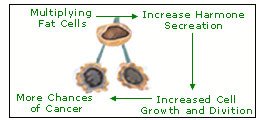|
A 2002 report issued by the World Health Organization�s International Agency
for Research on Cancer estimates that one-fifth to one-third of all
breast,
colon, endometrial, kidney and esophageal cancers can be related to
overweight and obesity. endometrial, kidney and esophageal cancers can be related to
overweight and obesity.
In a recent population study published in the New England Journal of Medicine
(April 24, 2003), researchers conclude that overweight and obesity account for
up to 14 percent of all cancer deaths in American men over 50 and 20 percent of
all cancer deaths in American women over 50. The researchers estimated that more
than 90,000 deaths from cancer per year could be avoided if all adults
maintained a normal body weight throughout life.
What's the link ?
Fat cells are known to secrete hormones and hormone-like substances into the
blood stream to help cells grow properly. Many scientists believe that in people
with excess body fat, greater amounts of hormones are produced causing cells to
grow and divide rapidly. Under these conditions, the chances increase that cell
division will go wrong, leading to cancer. Also, the more the women weigh, the
higher their levels of a form of estrogen called estradiol. body fat, greater amounts of hormones are produced causing cells to
grow and divide rapidly. Under these conditions, the chances increase that cell
division will go wrong, leading to cancer. Also, the more the women weigh, the
higher their levels of a form of estrogen called estradiol.
For instance, excess body fat has been linked to
postmenopausal breast cancer
because of its effect on estrogen levels. Although the ovaries stop producing
estrogen after menopause, fat cells continue to pump the hormone into the blood
stream. Scientists believe that this extended lifetime exposure to estrogen
increases breast cancer risk after menopause.
Carrying excess weight may also encourage backflow of stomach acid into the
esophagus, which has been linked to cancer of the esophagus. In addition,
obesity makes cancer harder to diagnose and treat. Excess weight may interfere
with proper examination or testing or even influence the effectiveness of cancer
treatment.
Researchers connect excessive fat to the development of all
�hormonal� cancers�breast, prostate, ovary, endometrial and testes. The
international study comparing obese women to women of normal weight confirms
what doctors have long suspected � that fat cells release the hormone into the
blood, allowing it to help turn normal cells cancerous.
|
According
to the AICR, obesity increases the likelihood of developing the following
cancers by 25 to 33 percent: |
|
|
Breast (post-menopausal)
Colon
Endometrial
Esophageal
Kidney
Prostate |
|
Steps you can take
The recommendations of the AICR report can be summarized in six practical
guidelines. These simple action steps represent the best advice science
currently offers for lowering your cancer risk.
1. Choose a diet rich in a
variety of plant-based foods
Vegetables, fruits, whole grains and beans contain natural substances that help
our bodies destroy carcinogens before they cause cancer. In study after study,
scientists have documented various
vitamins,
minerals and other helpful
compounds within these foods that fight � and sometimes even reverse � the
cancer process. Focusing on plant foods doesn't have to mean banishing meat
altogether. Add more rice and beans, more salad, more steamed vegetables to your
dinner plate, and you'll likely find meat and other animal-based foods being
nudged to the side. bodies destroy carcinogens before they cause cancer. In study after study,
scientists have documented various
vitamins,
minerals and other helpful
compounds within these foods that fight � and sometimes even reverse � the
cancer process. Focusing on plant foods doesn't have to mean banishing meat
altogether. Add more rice and beans, more salad, more steamed vegetables to your
dinner plate, and you'll likely find meat and other animal-based foods being
nudged to the side.
2. Eat plenty of vegetables and fruits
In addition to vitamins and minerals,
vegetables and fruits contain thousands of natural substances called phytochemicals. Researchers are hard at work trying to discover the role of
phytochemicals in cancer prevention. It now appears these substances work
together in complex ways.
natural substances called phytochemicals. Researchers are hard at work trying to discover the role of
phytochemicals in cancer prevention. It now appears these substances work
together in complex ways.
For this reason, most researchers believe that foods are more effective at
preventing cancer than dietary supplements. Study after study indicates the
best way to ensure you're getting a safe and effective mix of phytochemicals
is to stick with a mostly plant-based diet high in vegetables and fruits.
3. Maintain a healthy weight and be physically active
Physical activity plays a vital
role in helping us reach and stay at a healthy weight. Regular exercise burns
calories, builds muscle and helps the body run more efficiently. In addition,
there is now scientific evidence that exercise itself possesses anti-cancer
benefits. Regular physical activity has been shown to protect against colon
cancer, and it probably lowers the risk for lung and breast cancers as well. Go
about household chores or outdoor jobs with a bit more spring in your step.
Everything from vacuuming and mopping to washing the car and pushing a lawn
mower around can give you a workout, if you do it energetically. At home or out,
use the stairs as often as you can. Walk to the corner market for bread instead
of taking the car. For people with sedentary jobs and lives, the AICR report recommends an hour a day of moderate
physical activity and an hour a week of vigorous activity. If you are not
currently active, start slowly and gradually add more activity to your day.
You also don't have to set aside an entire hour for exercise. Break up your
workouts however you like throughout the day. Remember that all activity is
good for you, and some is better then none. Regular exercise burns
calories, builds muscle and helps the body run more efficiently. In addition,
there is now scientific evidence that exercise itself possesses anti-cancer
benefits. Regular physical activity has been shown to protect against colon
cancer, and it probably lowers the risk for lung and breast cancers as well. Go
about household chores or outdoor jobs with a bit more spring in your step.
Everything from vacuuming and mopping to washing the car and pushing a lawn
mower around can give you a workout, if you do it energetically. At home or out,
use the stairs as often as you can. Walk to the corner market for bread instead
of taking the car. For people with sedentary jobs and lives, the AICR report recommends an hour a day of moderate
physical activity and an hour a week of vigorous activity. If you are not
currently active, start slowly and gradually add more activity to your day.
You also don't have to set aside an entire hour for exercise. Break up your
workouts however you like throughout the day. Remember that all activity is
good for you, and some is better then none.
4. Drink alcohol only in
moderation, if at all
Alcohol probably
increases the risk for cancers of the colon, rectum and breast, even at very
low levels of consumption. And cancer isn't the whole story. High alcohol
consumption is also linked to high blood pressure, stroke,
heart disease,
birth defects, osteoporosis, accidents, violence and suicide. If you do drink
alcohol, use moderation. 'Moderation' means women should have no more than one
drink a day, and men should have no more than two drinks a day.
5. Select foods low in fat
and salt
According to research,
fat and
salt are two additional substances that could increase
 our risk for cancer and
other health problems. High fat diets possibly increase the risk for cancers
of the lung, colon, rectum, breast, endometrium (uterine lining) and prostate.
In addition, eating too many fatty foods can lead to obesity and the rise in
cancer risk that comes with it. AICR recommends
minimizing the saturated and
trans-fats in your diet. Instead, choose moderate amounts of
monounsaturated
fats such as olive and canola oils. our risk for cancer and
other health problems. High fat diets possibly increase the risk for cancers
of the lung, colon, rectum, breast, endometrium (uterine lining) and prostate.
In addition, eating too many fatty foods can lead to obesity and the rise in
cancer risk that comes with it. AICR recommends
minimizing the saturated and
trans-fats in your diet. Instead, choose moderate amounts of
monounsaturated
fats such as olive and canola oils.
Diets high in salt and salted foods probably increase the risk for stomach
cancer. Processed foods can be high in sodium. When you can't cook from
scratch, compare labels and select lower sodium varieties of frozen dinners,
canned soups and vegetables. For rice mixes, use only part of the seasoning
packet. Rinse canned beans to wash away some of the salt.
6. Prepare and store food
safely
Cooking meat, poultry and fish at
high temperatures, especially over an open flame, causes cancer-promoting
substances called HCAs (heterocyclic amines) to form on the surface of the
meats. In addition, when fat drips into the fire, the smoke and flames that
rise up onto the food leave behind carcinogenic substances called PAHs
(polycyclic aromatic hydrocarbons). A diet high in meat cooked by grilling,
barbecuing, broiling or pan frying possibly increases the risk of stomach,
colon and rectal cancers. causes cancer-promoting
substances called HCAs (heterocyclic amines) to form on the surface of the
meats. In addition, when fat drips into the fire, the smoke and flames that
rise up onto the food leave behind carcinogenic substances called PAHs
(polycyclic aromatic hydrocarbons). A diet high in meat cooked by grilling,
barbecuing, broiling or pan frying possibly increases the risk of stomach,
colon and rectal cancers.
When cooking meats, it's best to use
lower-heat options like baking, poaching,
stewing, roasting and microwaving.
7. Do not use tobacco in
any form
Tobacco is the chief cause of
lung cancer in the world, and it also causes cancers of the mouth and throat.
In addition, tobacco contributes to cancers of the pancreas, cervix and
bladder. Regardless of how it's used � as cigars, cigarettes, pipes or chew �
the link between tobacco and cancer is clear. the mouth and throat.
In addition, tobacco contributes to cancers of the pancreas, cervix and
bladder. Regardless of how it's used � as cigars, cigarettes, pipes or chew �
the link between tobacco and cancer is clear.
There are many successful methods for quitting tobacco use.
Adapt these guidelines in your daily life to achieve a healthy weight and
prevent cancer.
Article
contributed by
WF
Team on 31st January, 2004
More:
Breast Cancer: Looking ahead at Life
�Cancer is a frightening word surrounded by fears and myths.
One of the greatest fears expressed by almost all newly diagnosed
cancer patients is: `Am I going to die?' Read on....
Skin Cancer
�Skin cancer, usually results from prolonged exposure to sun. Most skin
cancers are curable, but one form, malignant melanoma, can be fatal. Read
on....
Ovarian Cancer
�Ovarian cancer is the second most common
reproductive cancer in women after endometrial cancer. Cancer occurs when cells
undergo a transformation and begin to grow and multiply without normal controls.
As the cells grow and multiply, they form masses called tumors. Ovarian cancer
occurs when a tumor forms in one or both of a woman's ovaries. Read on.... |